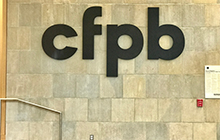 On July 6, 2020, the Consumer Financial Protection Bureau (CFPB) announced that it filed a lawsuit against a Delaware financial services company and the company’s founder in the Southern District of New York. The complaint alleges that the company engaged in deceptive acts and practices under the Consumer Financial Protection Act (CFPA), 12 U.S.C. § 5531, through its Healthcare Finance (HCF) Savings CD Accounts program.
On July 6, 2020, the Consumer Financial Protection Bureau (CFPB) announced that it filed a lawsuit against a Delaware financial services company and the company’s founder in the Southern District of New York. The complaint alleges that the company engaged in deceptive acts and practices under the Consumer Financial Protection Act (CFPA), 12 U.S.C. § 5531, through its Healthcare Finance (HCF) Savings CD Accounts program.
According to the Bureau, beginning in August 2019, the company began offering consumers HCF CD accounts, but allegedly misrepresented that the funds would be used to originate loans for healthcare professionals who wanted to purchase or start a new practice, and that these loans would subsequently be sold to secondary investors. The CFPB alleges that no such loans were ever originated and that the funds were instead placed in a hedge fund owned by the company’s founder and invested in securities. The CFPB further alleges that the company made other false representations about this CD program including: (1) misrepresenting that it always had a buyer lined up prior to the loan’s origination; (2) misrepresenting that to the extent funds were not being used to originate loans, the money would be held in a FDIC-insured account, a Lloyd’s of London-insured account, or a “cash equivalent” account; (3) falsely comparing these accounts to savings accounts and falsely describing itself as a “commercial bank”; and (4) misrepresenting past returns on these accounts. At least 400 consumers allegedly purchased these accounts, collectively depositing over $15 million.
The CFPB’s complaint comes on the heels of its investigation of the company. In March 2020, the CFPB requested that the company cease offering these CD products to consumers and remove all marketing of the product from its website. Although the company indeed ceased marketing this product on its website, its founder allegedly attempted to continue to sell the product under a new name. In the complaint, the CFPB seeks damages, consumer restitution, disgorgement, civil money penalties, and injunctive relief.
